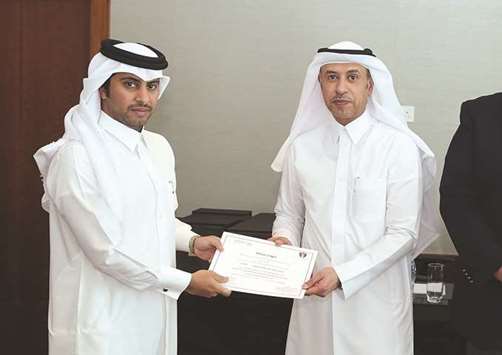HE the Minister of Administrative Development, Labour and Social Affairs Dr Issa Saad al-Jafali al-Nuaimi, who is also the chairman of National Committee for Combating Human Trafficking, honoured participants of two workshops on combating human trafficking.
The event took place as part of the workshops to support the capacity of national agencies in combating human trafficking and on identifying human trafficking to journalists, media personnel and media students. The workshops were organised by the National Committee for Combating Human Trafficking in co-operation with United Nations Office on Drugs and Crime (UNODC) within the Arab initiative to build national capacity in combating human trafficking in the Arab countries. The initiative was launched in 2010 with the support and sponsorship of the State of Qatar.
The first workshop was attended by 20 national personnel in the judiciary, public prosecution, police and legal affairs at the Ministry of Justice, whereas the second workshop was attended by 20 media specialists. The head of the Human Rights Department in the Foreign Ministry ambassador Faisal bin Abdullah al-Henzab, who is also deputy chairman of National Committee for Combating Human Trafficking said both workshops aimed to build the specialist national capacities in the field of combating human trafficking, which comes as part of the continuous programme to support the national competencies in the Arab countries, which was launched in 2010 with the support of Qatar.
Al-Henzab added that training Qatari personnel to build their competencies in the field of combating human trafficking, in law enforcement authorities or media professionals is very important, to gain skills in dealing with human trafficking cases. The first priority of the National Committee for Combating Human Trafficking was to set a strategic plan that is revisited annually on three main areas.
The first area is related to directed awareness to media outlets, training along the lines of the workshop to train personnel in the judiciary, prosecution and police, and finally co-operating with regional and international organisations through the regional office of the UNODC, al-Henzab said. The ambassador said human trafficking is a transnational phenomena that threatens the global community and is not limited to one state. And hence the National Committee for Combating Human Trafficking’s plan is one of the ambitious plans to tackle the issue especially since humans are a main pillar in the development of the State of Qatar. He added that human trafficking is one of the obstacles to national development.
The ambassador confirmed that the Committee has ambitious plans in this area, which is not only limited to Qatar but through international partnerships aimed at eliminating this scourge and phenomenon. He added that co-operating with UNODC through its GCC regional office is not the first of its kind, where in the past series of workshops have been held, and there is a strong relation between both parties through the Arab initiative which was supported and sponsored by Qatar with $6mn. There will be another workshop in the future for the national personnel in Qatar, the ambassador said.
Al-Henzab said that Qatar continues its support in the field of combating human trafficking which is related to the state’s international agenda, and is important to the global community. It is not limited only to Qatar and the region alone, and it is not limited only to human trafficking, however, it works on promoting and protecting labour rights, starting with the great developments achieved by Qatar on this matter in the recent years through the technical co-operation with the International Labour Organisation.
The national capacity training programme on human trafficking comes as part of the close and extended partnership between UNODC and the Government of Qatar, represented by the National Commission for Combating Trafficking in Human Beings, where the programme aims to develop the national system for the prevention and control of the crime of human trafficking, UNODC GCC representative Hatim Ali stated.
Ali noted that the phenomenon of trafficking in human beings is a transnational crime that targets the most stable and economically prosperous states for profit and in response to this transnational challenge, Qatar has developed its national legislation, established the National Commission and is currently working on the training of cadres to create a generation of trainers and experts in partners such as the judiciary, the police, the Public Prosecutor’s Office and work the way to national partners such as the media.

HE the Minister of Administrative Development, Labour and Social Affairs Dr Issa Saad al-Jafali al-Nuaimi handing over a certificate to one of the participants.
